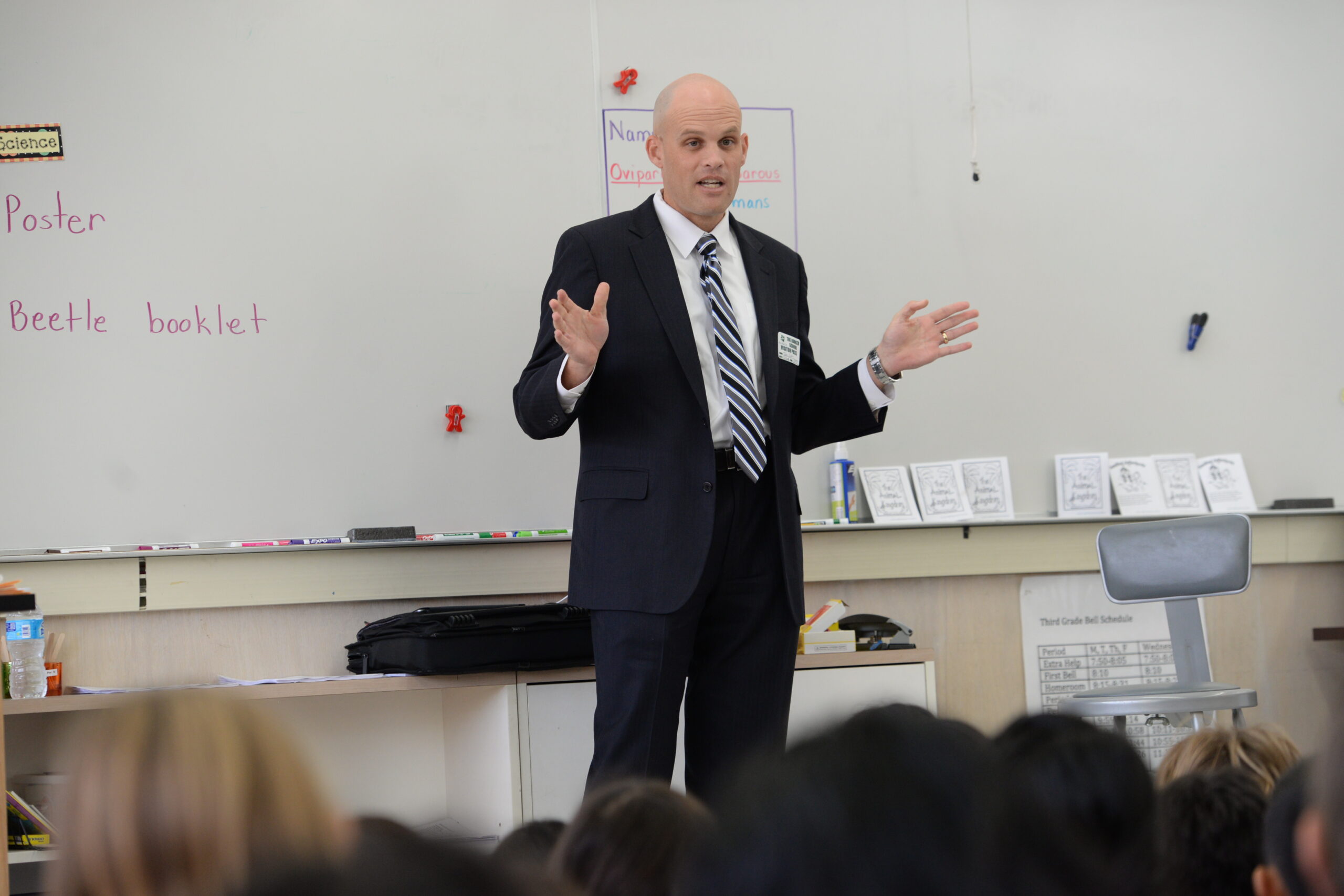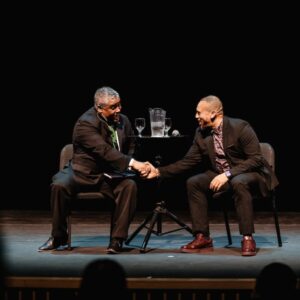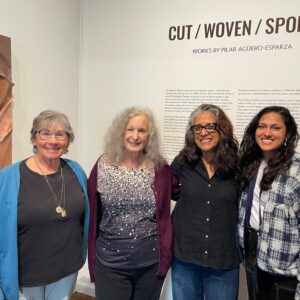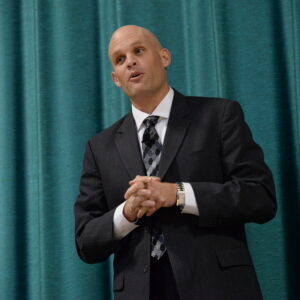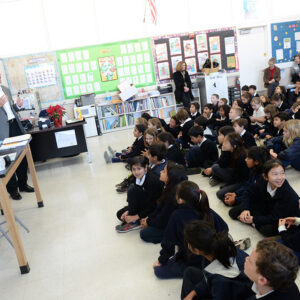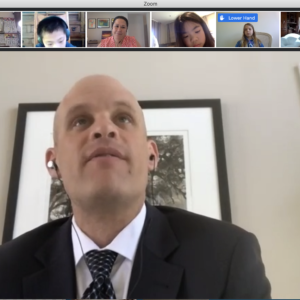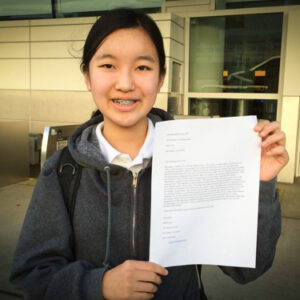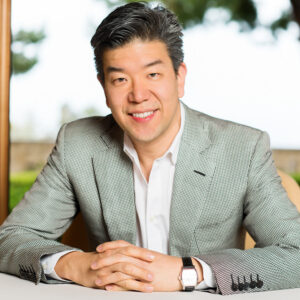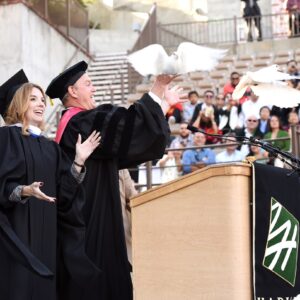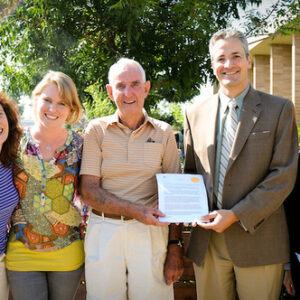In early December the lower school’s entire grade 3 class enjoyed a very special visit from Harker alumnus John Owens ‘85, who last year made the news when he was appointed to a seat on the U.S. Court of Appeals for the 9th Circuit.
Sitting cross-legged on the floor in room 110, the third graders, who will soon be studying about the government at the local, state and federal levels, were enthralled by Judge Owen’s informative and entertaining talk about serving on the nation’s largest appeals court, which shapes federal law from districts in California and eight other Western states.
But long before he became a judge, Owens got his start at Harker in 1979, when he transferred from an East Bay public school as a grade 3 student himself. Many of the students at his talk were surprised to learn that his own third grade teacher was none other than Sarah Leonard, the lower school’s primary division head, who began her career at Harker as a lower school teacher.
“To this day I have vivid memories of John as one of my own former students. He is a role model in regards to what can happen when a strong work ethic and a determined, can-do attitude are at play,” recalled Leonard.
Owens noted how lucky they were to be attending the lower school. He then gave them a behind-the-scenes look at being a judge – a job he explained he is able to keep for life, should he so choose.
After his talk, he allowed plenty of time for questions and answers. Students asked such questions as, “What if the government picks a bad jury?” (answer: there might be a new trial) and “What if someone found innocent is actually guilty?” (answer: they cannot be tried again). The kids also had many questions about lie detectors.
“It was awesome! I learned a lot about being a judge and the government and how everything works,” said student Sohum Arora.
His mom, Shubhangi Kapatkar, said she was grateful to Harker for giving the third graders the opportunity to receive a visit from Judge Owens. “Sohum was so excited to tell me all about it, he just kept talking about him until he went to sleep. He seemed to be really pumped up seeing a real judge in his real life. … He never usually tells me about what happens in school, so this was a special day for him.”
Indeed, life for Owens, a former lawyer, has changed significantly ever since President Barack Obama nominated him to a seat on the U.S. Court of Appeals. Drawing a map of the states for the students on the whiteboard, Owens explained that judges on the 9th Circuit review the decisions of federal trial courts in Alaska, Arizona, California, Hawaii, Idaho, Montana, Nevada, Oregon, Washington and certain islands in the Pacific.
Owens has served as a law clerk for Judge J. Clifford Wallace of the 9th U.S. Circuit Court of Appeals and for Justice Ruth Bader Ginsburg of the U.S. Supreme Court. Prior to that Owens was a federal prosecutor and served as chief of the criminal division in the San Diego U.S. attorney’s office. At the age of 19, he worked in the publicity department of the Golden State Warriors basketball team. He and his wife, Marjorie, have two daughters and live in San Diego.
While working with Ginsberg in 1998, Owens helped set up a visit to the Supreme Court for a group of grade 8 Harker students who were in Washington, D.C., on their class trip. “Justice Ginsburg addressed the students in the courtroom, and answered their questions. I was very proud of my fellow Harker Eagles that day,” he recalled.
Of his time at Harker, he stressed that the school remains “the most significant professional and personal influence on me.” Harker, he said, provided him with the study skills necessary to succeed in school, and more important, the ethics and values to succeed in life. Owens started out as a Harker student in 1979, graduated from grade 8 in 1985, and worked as a summer camp counselor/coach at the school from 1985 until 1991. Today, he remains active with the school as a member of Harker’s distinguished board of fellows.
When asked to offer parting words of wisdom to the students, Owens stressed how important it is to be kind to others and that reaching goals takes really hard work. “So,” he advised, “work hard at whatever it is you want to do.”
“It was heartwarming to see the connection he was able to make with the children. Almost effortlessly, he was able to establish and maintain a lively but meaningful rapport with them. With the perfect mix of knowledge, humor and crowd management skills, he left the children with a memorable experience that I hope they carry with them for a long time to come,” noted Leonard.
